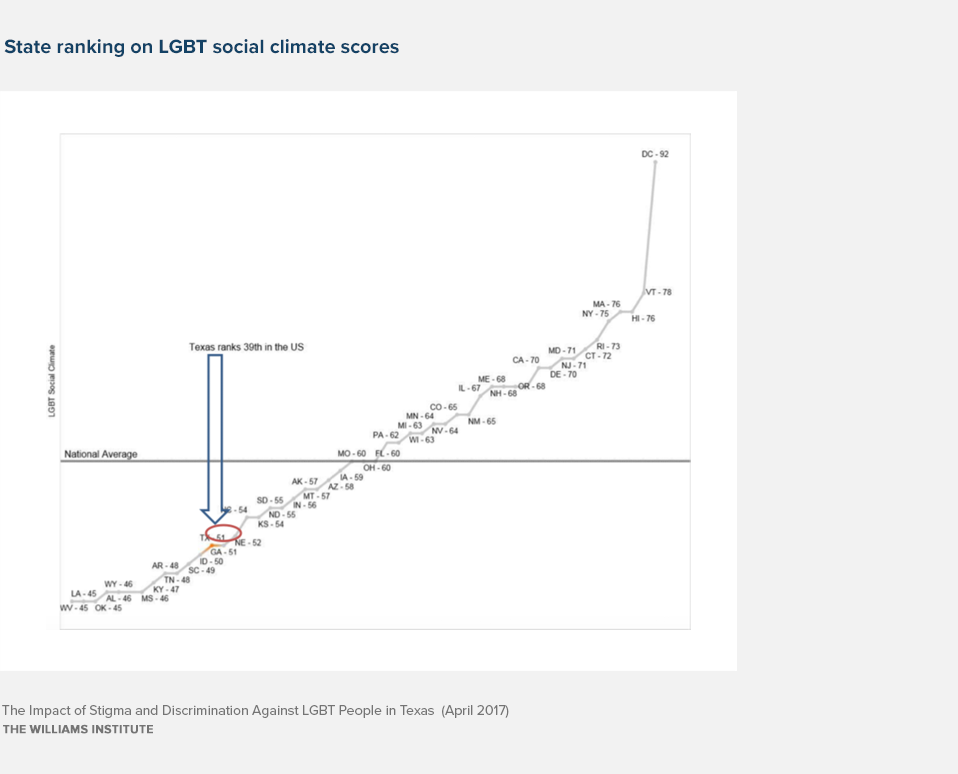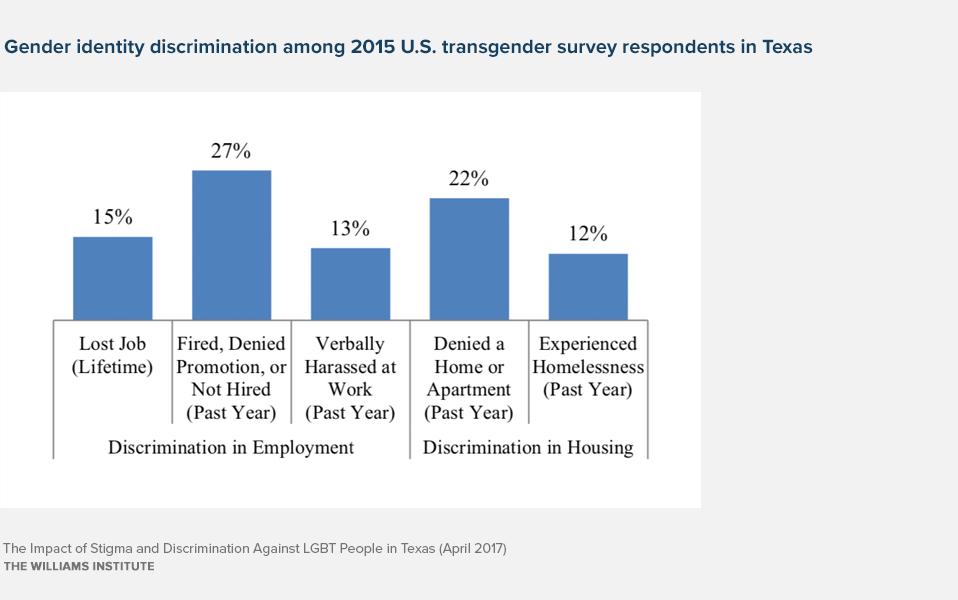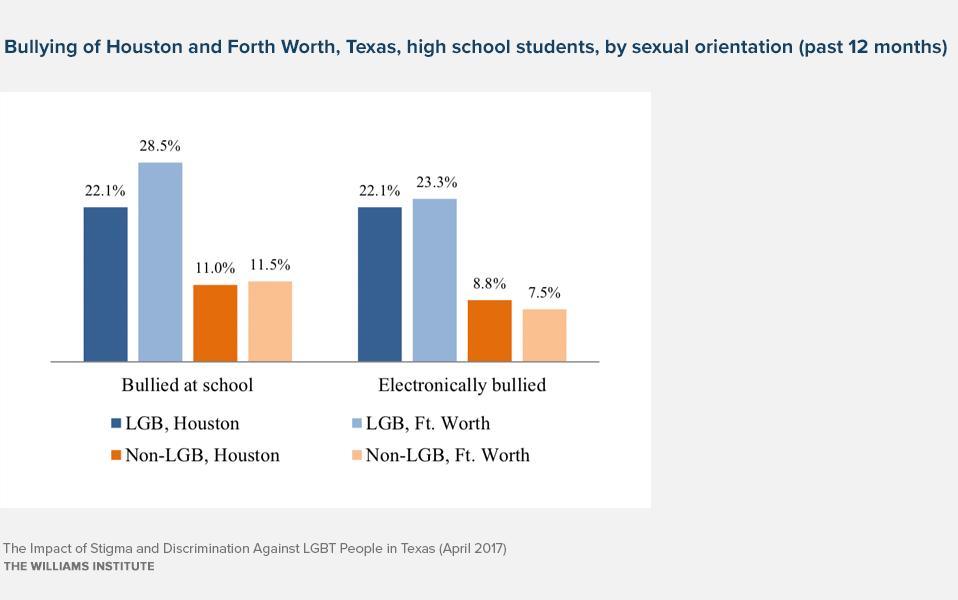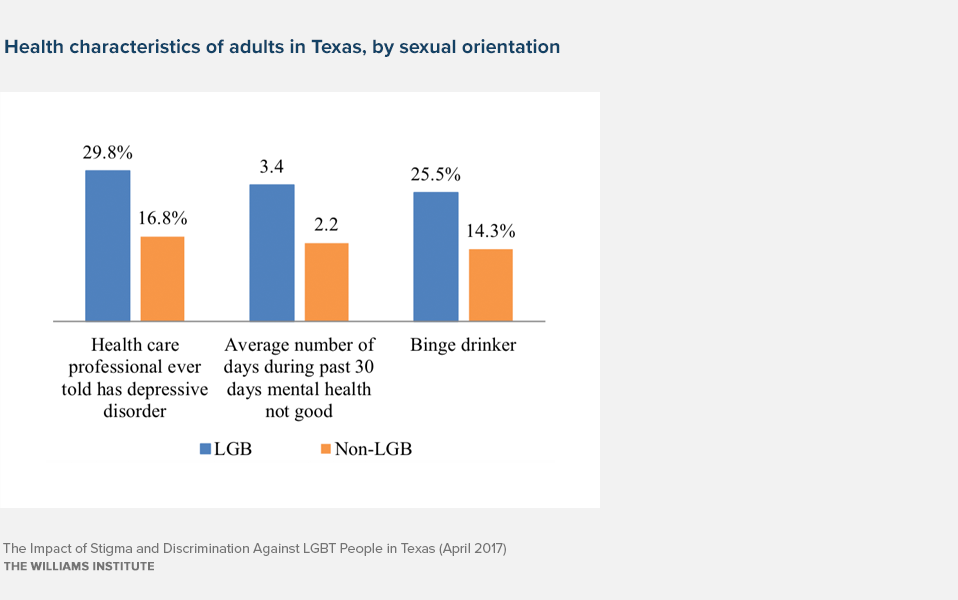Executive Summary
Texas is home to over 770,000 LGBT adults and 158,500 LGBT youth. LGBT people in Texas lack important legal protections and face a less supportive social climate than LGBT people in many other states. For example, statewide laws in Texas offer no protections from discrimination based on sexual orientation or gender identity in areas such as employment, housing, and public accommodations. Texas also has an anti-LGB curriculum law, requiring that teachers provide anti-LGB instruction during sex education lessons, and state law fails to adequately protect LGBT students from bullying. In terms of social climate, Texas ranks 39th in the nation on public support for LGBT rights and acceptance of LGBT people. However, a growing number of businesses in Texas have adopted LGBT-inclusive non-discrimination policies, and social attitudes toward LGBT people are becoming more positive over time.
The legal landscape and social climate for LGBT people in Texas likely contributes to an environment in which LGBT people experience stigma and discrimination. Stigma and discrimination can take many forms, including discrimination and harassment in employment and other settings; bullying and family rejection of LGBT youth; overrepresentation in the criminal justice system; and violence. Research has linked stigma and discrimination against LGBT people to negative effects on individuals, businesses, and the economy.
In this study, we provide data and research documenting the prevalence of several forms of stigma and discrimination against LGBT adults and youth in Texas, including discrimination and harassment in employment, housing, and public accommodations; bullying and harassment in schools; and family rejection of LGBT youth. We discuss the implications of such stigma and discrimination on LGBT individuals, in terms of health and economic security; on employers, in terms of employee productivity, recruitment, and retention; and on the economy, in terms of health care costs and reduced productivity.
To the extent that Texas were able to move toward creating more supportive environment for LGBT people, it would likely reduce economic instability and health disparities experienced by LGBT individuals, which, in turn, would benefit the state, employers, and the economy.
Key Findings
Prevalence of Stigma and Discrimination against LGBT People in Texas
LGBT People in Texas Experience Discrimination in Employment, Housing, and Public Accommodations
- The 2015 U.S. Transgender Survey report, based on the largest survey of transgender and gender non-conforming people in the U.S. to date, found of respondents from Texas, 27%reported being fired, denied a promotion, or not being hired for a job they applied for in the year prior to the survey because of their gender identity, and 13% reported being verbally harassed at work in the year prior to the survey because of their gender identity. In addition, 22% of transgender respondents from Texas reported that they had experienced housing discrimination because of their gender identity within the past year, and 12% reported that they had experienced homelessness because of their gender identity within the past year.
- Public opinion polling indicates that 79% of Texas residents, non-LGBT and LGBT, believe that LGBT people experience discrimination in the state.
- Discrimination against LGBT people in Texas has also been documented in a number of court cases and the media. Instances of employment discrimination documented in these sources involve private and public sector workers in a range of occupations including, for example, teachers, a police detective, a bank employee, and a hospital architect. Examples of discrimination in housing and public accommodations have also been documented in these sources.
LGBT Youth in Texas Experience Bullying and Harassment at School
- The 2015 Youth Risk Behavior Survey from Houston and Fort Worth, Texas, found that LGB students were more likely to report being bullied at school (Houston: 22.1% v. 11.0%; Fort Worth: 28.5% v. 11.5%) and electronically bullied (Houston: 22.1% v. 8.8%; Fort Worth: 23.3% v. 7.5%) in the 12 months prior to the survey than non-LGB students.
- In addition, LGB students in Houston and Fort Worth were more likely than non-LGB students to report missing school because they felt unsafe at least once in the month prior to the survey (Houston: 17.7% v. 8.3%; Fort Worth: 16.4% v. 6.0%).
- The 2015 U.S. Transgender Discrimination Survey report found that 73% of respondents who were perceived to be transgender while in grades K-12 experienced verbal, physical, or sexual harassment at school.
- A 2012 campus climate report based on a survey of graduate students at Texas A&M University found that 14% of all students reported observing inappropriate behaviors (such as hostile comments and discriminatory treatment) based on sexual orientation and 10% of all students reported observing inappropriate behaviors based on gender identity or expression.
- The University of Texas at Austin received 63 complaints of sexual orientation bias, 51 complaints of gender expression bias, and 47 complaints of gender identity bias
over a three-year period from 2012 to 2015.
Impact of Stigma and Discrimination on LGBT Individuals
LGBT People in Texas Experience Economic Instability
- Stigma and discrimination against LGBT workers can lead to economic instability, including lower wages and higher rates of poverty.
- Gallup polling data from 2012-2014 indicate that 30% percent of Texas LGBT adults and 26% of non-LGBT adults reported having a household income below $24,000.
- Gallup data also indicate that about one-quarter of LGBT adults (26%) in Texas reported that they do not have enough money for food compared about one-fifth of non-LGBT adults (19%). Similar proportions of LGBT and non-LGBT people reported that they do not have enough money to meet their health care needs.
- The 2015 U.S. Transgender Survey report found that 17% of respondents in Texas were unemployed, and 34% were living in poverty.
LGBT Adults and Youth in Texas Experience Health Disparities
- Research indicates that stigma and discrimination contribute to adverse health outcomes for LGBT people such as major depressive disorder, binge drinking, substance use, and suicidality. Similarly, bullying and family rejection, as well as social stigma more broadly, have been linked to the increased likelihood of school dropout, suicide, and substance use among LGBT youth.
- LGBT adults in Texas who completed the 2015 Behavioral Risk Factor Surveillance System (BRFSS) survey were significantly more likely to have been diagnosed with a depressive disorder by a health care professional than non-LGB adults who completed the survey (29.8% v. 16.8%). In addition, LGBT adults were significantly more likely to report binge drinking than non-LGBT adults (25.5% v. 14.3%).
- The 2015 Youth Risk Behavior Survey from Houston and Fort Worth found that LGB students were much more likely to have seriously considered suicide in the year prior to the survey compared to non-LGB students (Houston: 34.5% v. 11.6%; Fort Worth: 40.7% v. 11.3%).
- LGB students in Houston and Fort Worth were also more likely than non-LGB students to report smoking cigarettes (Houston: 30.5% v. 14.7%; Fort Worth: 20.0% v. 12.5%), drinking (Houston: 36.7% v. 24.9%; Fort Worth: 38.3% v. 28.2%), and using marijuana (Houston: 26.6% v. 18.0%; Fort Worth: 35.2% v. 18.3%) in the month prior to the survey.
Economic Impacts of Stigma and Discrimination
Discrimination against LGBT People in Employment and Other Settings Has Economic Consequences for Employers and the State Government
- Productivity. Unsupportive work environments can mean that LGBT employees are less likely to be open about their sexual orientation or gender identity at work, and more likely to be distracted, disengaged, or absent, and to be less productive. These outcomes could lead to economic losses for state and local governments, as employers, and private businesses in the state. Given that over 520,000 workers in Texas identify as LGBT, the loss in productivity from a discriminatory environment could be significant.
- Retention. LGBT employees in less supportive work environments feel less loyal to their employers, and are more likely to plan to leave their jobs. Given the average replacement costs of an employee, public and private employers risk losing $9,300, on average, for each employee that leaves the state or changes jobs because of an unsupportive policy or social environment in Texas.
- Recruitment. Many LGBT and non-LGBT workers, in particular those who are younger and more highly educated, prefer to work for companies with more LGBT-supportive policies, and in states with more supportive laws. To the extent that workers from other states perceive Texas to be unsupportive of LGBT people, it may be difficult for public and private employers in the state to recruit talented employees from other places.
- Public Benefits Expenditures. Discrimination in employment and housing can lead to hardships for individuals including lower earnings, underemployment or unemployment, and loss of housing, which in turn can lead to increased reliance on public benefits. As an illustration of how the state is impacted by the economic instability of LGBT residents, we estimate that discrimination in the workplace and in housing against transgender people annually costs Texas approximately $1,253,000 in state Medicaid expenditures and $372,000 in homeless shelter expenditures.
Bullying and Family Rejection of LGBT Youth Negatively Impact the Economy
- Bullying and family rejection of LGBT youth can cause them to miss or drop out of school, become homeless, or unemployed or underemployed.
- In response to the 2015 U.S. Transgender Survey report, of those respondents from Texas who said they had been harassed in school, 14% reported that the harassment was so severe that they had to drop out.
- School drop-out and homelessness that arise due to bullying and family rejection are harmful not only to individual LGBT youth, but also have societal consequences in that they reduce the capacity of these youth to contribute to the economy as adults.
- In addition, school-based harassment and family rejection can increase costs to the state via Medicaid expenditures, incarceration, and lost wages. The Jim Casey Foundation has estimated that homelessness, juvenile justice involvement, and poor educational and employment outcomes cost nearly $8 billion per cohort that ages out of foster care each year in the U.S. The best available data suggest that LGBT youth make up one-fifth, if not more, of each annual aging out cohort.
Health Disparities for LGBT People Negatively Impact the Economy
- A more supportive legal landscape and social climate for LGBT people in Texas is likely to reduce health disparities between LGBT and non-LGBT people which would increase worker productivity and reduce health care costs.
- We estimate that reducing the disparity in major depressive disorder between LGBT and non-LGBT people in Texas by 25% to 33.3% could benefit the state’s economy by $289.9 million to $385.3 million, and reducing the disparity in binge drinking by the same proportion could benefit the state’s economy by $118.3 million to $157.2 million in increased productivity and reduced health care costs each year. To the extent that a more supportive legal landscape and social climate would reduce other health disparities, the state’s economy would benefit even more.




